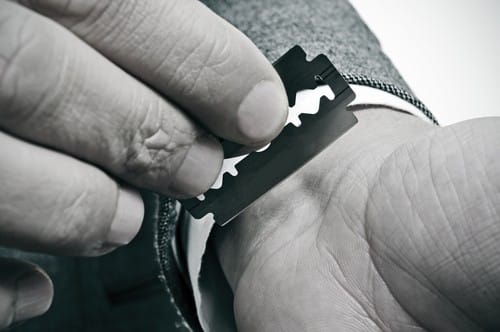Common warning signs of adolescent depression include mood changes, withdrawal from family and friends, declining grades, and loss of interest in activities. Parents should approach their teens with empathy, open dialogue, and avoid judgment. It’s crucial to seek professional help from mental health experts like those at Visions Treatment Centers, who offer comprehensive care for adolescent mental health and substance abuse.
As a parent, it can be challenging to distinguish between typical teenage moodiness and the more serious warning signs of adolescent depression.
Failing to recognize these signs can lead to worsening mental health and missed opportunities for early intervention and support from a teen depression treatment center. Early recognition of these symptoms is crucial in providing timely support.
In this article, we explore nine warning signs of adolescent depression so you know when it may be time to reach out to a teen treatment center for support.
Warning Signs of Adolescent Depression
Recognizing the warning signs of adolescent depression is a crucial aspect of ensuring timely and effective support for teenagers. Often, these signs can be subtle and easily mistaken for typical teen behavior, making it imperative for parents and caregivers to be observant and informed.
Understanding what to look for is the first step in identifying a potential issue. Once these signs are noticed, the next crucial step involves approaching the situation with empathy and seeking professional guidance, such as the comprehensive care offered in Southern California at Visions Treatment Centers, to address the needs of the adolescent effectively.
Here are crucial warning signs of adolescent depression:
1. Persistent Signs of Sadness
Sadness is a normal and crucial human emotion, an inescapable part of basic empathy – but we often experience sadness as a response. In cases of depression, sadness – or, more accurately, a general low mood and lack of joy – becomes the default. Teens experiencing depression as a mental health disorder struggle to feel happy for more than a few fleeting moments and generally don’t feel like life is worth living.
2. Irritability and a Shortened Temper
Not all cases of depression are explicitly highlighted by fatigued behavior and a meek mood. Especially among teenage boys, depression is usually highlighted by irritability, a shortened temper, and a tendency to lash out more often. Researchers believe that depression may be underdiagnosed among boys because we don’t always screen primarily angry kids for other depressive symptoms.
Related: The Dos and Don’ts of Helping Teens with Depression
3. Consistently Poor Sleep
Teens aren’t generally known for stellar sleeping habits, especially because teenagers may have a biological inclination to stay up later than children or adults. However, depression often correlates with insomnia and chronic oversleeping, which further contributes to poor mood and cognitive problems.
Related: How to Get Depressed Teenagers Out of Bed
4. Loss of Interest in Old Hobbies
A crucial symptom of adolescent depression is anhedonia or the loss of joy. Teens with depression can still laugh at a joke or find something amusing, but they no longer feel happy or struggle to find happiness in places they used to find it. They give up on old hobbies, drop old interests, and often cease contact with old friends.
Related: How to Motivate a Depressed Teenager
5. Chronic Fatigue
Persistent feelings of fatigue or low energy levels, even after adequate rest, are common among teens with depression. Being depressed is draining. It can cause physical and mental lethargy, and it’s hard to fight that feeling when your brain seems to tell you that nothing matters anyway. Behavioral scientists even posit that laziness or procrastination are signs of depression (NAMI).
6. Changes in Focus and Concentration
Deterioration in school performance, declining grades, or a lack of interest in academic activities are common in adolescent depression. Depression can affect the brain to the point that it becomes harder to retain learned information or access a teen’s cognitive capacity. Smart teens start to struggle with concepts at school as their depression becomes worse. Their memory fails because of how depression affects the brain. It becomes a vicious cycle.
7. Inexplicable Pains
Depressive disorders are linked to our perception of pain to the point that mental health therapy can help people with chronic pain feel better. The inverse is true as well – as depression gets worse, a person can begin to feel physical discomfort that wasn’t there before. In teens, this often results in inexplicable headaches or stomach aches with no apparent medical cause.
8. Social Withdrawal
Isolation and social withdrawal are also common signs of adolescent depression. Teens who struggle with depression might feel that they don’t contribute to the lives of those around them, or they’re disconnected emotionally from others and don’t feel like they’re part of a group despite being right in the middle of one.
Again, there’s an inverse relationship here, where prosocial behavior results in a lower risk of depression, and stronger social bonds and individual relationships can temper a person’s depressive symptoms. But for teens who start to isolate, it can become harder and harder to convince them to socialize again.
Why is Teen Depression Such a Problem?
Being a teenager has never been easy. Aside from external pressures, teens are also struggling with the emotional and physical challenges of adolescence.
They’re changing, a day at a time, and rapidly. They’re in an awkward social transition between childhood and adulthood. Among teens with susceptibility to mental health issues – studies show that genes often play a role in mood disorders – adolescence is the usual onset period for symptoms of severe depression, including self-loathing, consistently low mood, feelings of emptiness, and deep hopelessness.
Putting the worst consequence aside, untreated depression can also result in slowed cognitive development, poor academic performance, and worse outcomes in the job market, correlating to a higher risk of substance use and poverty. Recognizing teen depression is important because childhood symptoms of depression often persist into adulthood without treatment.
Related: How Does Depression Affect Teens?
Depression Treatment for Teens
Have you noticed changes in your teen’s behavior or mood that worry you? Recognizing these shifts is the first step in addressing adolescent depression.
At Visions Treatment Centers, we specialize in treating teen depression with a compassionate, holistic approach. Our programs are specifically designed to meet the unique needs of adolescents, fostering healing and growth.
If you’re seeing signs of depression in your teen, don’t hesitate to reach out.
Contact Visions Treatment Centers today, and let us help you and your teen navigate this challenging time with expertise and care. Your proactive step could be the turning point towards a brighter future for your teen.
Conclusion
Depression can be hard to identify and harder to treat. While we know that at least one-tenth of school-age teens struggle with severe depressive symptoms and about one in six teens experiences a significant depressive episode per year, we also know that not many teens are willing to come forward for treatment and that many are still worried about the stigma attached to depression and mental health problems in general.
Furthermore, while more teens today know about depression than ever before, most people’s understanding of depression is still limited. There are half a dozen common mood disorders, and we’re still finding out more about how depressive symptoms can differ between genders, for example.
Learn more about how we can help you or your loved one seek treatment for depression and other mental health problems at our Visions Treatment Centers. It’s important to understand and recognize the common warning signs of adolescent depression.








